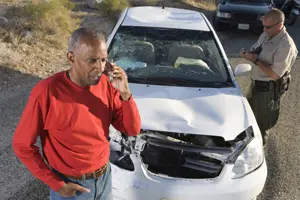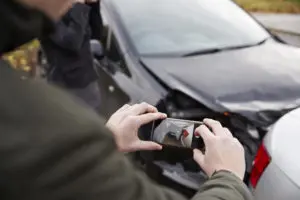Being in an automobile accident is a stressful and confusing time, and not knowing the right way to respond in the moment certainly doesn’t make it easier. Learn the best steps to take immediately after an accident.
 If you are in the state of Florida and you’ve been in an accident, the law says you have to call the police if there appears to be more than $500 worth of damage which, quite frankly, could happen in the most minor of fender-benders. You must also call the police if there have been any injuries.
If you are in the state of Florida and you’ve been in an accident, the law says you have to call the police if there appears to be more than $500 worth of damage which, quite frankly, could happen in the most minor of fender-benders. You must also call the police if there have been any injuries.
This is the technical answer. However, there are many reasons why you should call the police every time you’ve been in an accident. The police report is an official report that documents the accident. If you’ve been involved in an accident, be sure to give the officer all of the specific details of the incident, but do not admit that it was your fault or claim that it was the fault of the other driver. That is up to the police and insurance companies to decide. Your job is to simply tell what happened truthfully.
It’s important to protect your legal rights. Most likely, your accident was with a complete stranger and he or she may seem perfectly honest and reasonable right after the accident, but you don’t know what they may do or say after they get home and start to think about those big lawsuit dollars. Protect yourself first.
After an accident, you may not be thinking clearly, whether you’ve been injured or not. A police officer is a non-biased voice of reason. They can assess the situation and advise you on the drivability of your vehicle as well as explain what steps you need to take.
A police officer will get information that you may miss such as license plate numbers, names, addresses, insurance details, phone numbers, license numbers, and the makes and models of all vehicles involved. If you need to file a claim, you’ll need this information and it should all be contained in the police report.
Having a police officer control things after an accident is not only beneficial procedurally, but they can make sure things don’t escalate. People who’ve been in an accident can become heated when they look at the damage to their vehicle and having a police officer present can help everyone keep a cool head.
 One of the most important reasons to call the police if you’ve been in an accident is that you may be injured and not even know it. “Hidden injuries” are common after an accident and often go missed for days and even weeks or months. They’re difficult to detect and if left untreated, they can cause serious, long-term damage. By having a police report, you have an official record that includes all of the pertinent details should you need to file a claim.
One of the most important reasons to call the police if you’ve been in an accident is that you may be injured and not even know it. “Hidden injuries” are common after an accident and often go missed for days and even weeks or months. They’re difficult to detect and if left untreated, they can cause serious, long-term damage. By having a police report, you have an official record that includes all of the pertinent details should you need to file a claim.
Even if the police officer takes photos, you should take them as well so you can thoroughly document the damage for your own records. The police officer may miss something or not take many photos so be sure to take lots from several different angles.
Sometimes, the police will refuse to come to the scene of an accident if there are no personal injuries, there’s only minor damage, or if no one’s in danger. If this is the case, you can go to the nearest police station and file your own police report. It will still be an official document to support your claim.
After you’ve called the police and have done everything you need to at the scene of the accident, it’s important to be seen quickly by a physician who specializes in automobile accident injuries. At Complete Care Centers, our doctors are experts in detecting hidden injuries like whiplash that you may not know you have. They’ll diagnose any injuries you may have, come up with a comprehensive treatment plan, and help you with any necessary paperwork to file your claim.
If you’ve been in an accident, call Complete Care today!
The information provided on this website does not, and is not intended to, constitute legal advice; instead, all information, content, and materials available on this site are for general informational purposes only. Information on this website may not constitute the most up-to-date legal or other information. This website contains links to other third-party websites. Such links are only for the convenience of the reader, user or browser.